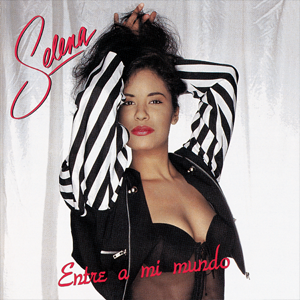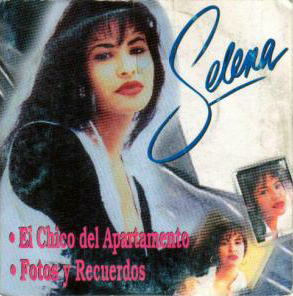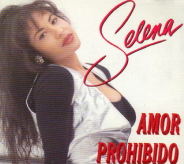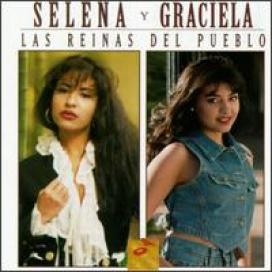
Selena Quintanilla Pérez, known professionally as Selena, was an American singer. Referred to as the "Queen of Tejano Music", her contributions to music and fashion made her one of the most celebrated Mexican-American entertainers of the late 20th century. In 2020, Billboard magazine put her in third place on their list of "Greatest Latino Artists of All Time", based on both Latin albums and Latin songs chart. Media outlets called her the "Tejano Madonna" for her clothing choices. She also ranks among the most influential Latin artists of all time and is credited for catapulting the Tejano genre into the mainstream market.

Entre a Mi Mundo is the third studio album by American singer Selena, released on May 6, 1992, by EMI Latin. The label endeavored to bolster Selena's popularity within the Latin music market in the United States with this release. Selena's brother, A. B. Quintanilla kept his role as the singer's producer and, in collaboration with Selena y Los Dinos members Pete Astudillo and Ricky Vela, composed tracks for the album. The ensuing recording encompassed an eclectic array of songs, attributable to the members' diverse backgrounds, which facilitated the modernization of the many genres they explored. Entre a Mi Mundo is a Tejano cumbia album that encapsulated Selena's quintessential sound, characterized by engaging tunes harmonized with her distinctive, plaintive vocals and a relaxed, danceable cumbia beat. The album incorporates musical inspirations from power pop, R&B, disco, rock, funk, and synthesized Tejano music.

Selena is the self-titled debut studio album by American Tejano singer Selena, released on October 17, 1989, by EMI Latin. Its music incorporates a range of contemporary genres with a mix of cumbia and regional styles of Mexican music. The album was released following company president Jose Behar's failed crossover request for the singer. The project was denied by the heads of EMI Records' pop division, believing the singer should first strengthen her fanbase. Selena's brother and principal record producer and songwriter, A.B. Quintanilla III fought to remain the singer's producer. The band introduced Pete Astudillo and Joe Ojeda, who contributed to the album's experimental production and songwriting. Aside from A.B., Selena worked with two Mexican songwriters, Alejandro Montealegre and Reinaldo Ornelas.

Live! or Selena Live! is a live album by American Tejano pop singer Selena, which was released on May 4, 1993, by EMI Latin. The album was re-released on September 22, 2002, as being part of the Selena: 20 Years of Music collection; which included spoken liner notes by her family, friends and her former band members Selena y Los Dinos. Live! includes three cumbia-influenced studio tracks, while the rest of the album consists of live versions of previously released songs. The album was recorded during a free concert at the Memorial Coliseum in Corpus Christi, Texas, on February 7, 1993. It was certified gold by the Recording Industry Association of America in its first year, double platinum in 1995, and 8× platinum in 2017.

Dreaming of You is the fifth and final studio album by American singer Selena. Released posthumously on July 18, 1995, by EMI Latin and EMI Records, it was an immediate commercial and critical success, debuting atop the United States Billboard 200—the first predominately Spanish-language album to do so. It sold 175,000 copies on its first day of release in the U.S.—a then-record for a female vocalist. With first week sales of 331,000 units, it became the second-highest first-week sales for a female musician since Nielsen Soundscan began monitoring album sales in 1991. Billboard magazine declared it a "historic" event, while Time said the recording elevated Selena's music to a wider audience. It won Album of the Year at the 1996 Tejano Music Awards and Female Pop Album of the Year at the 3rd annual Billboard Latin Music Awards.

Siempre Selena is the second posthumously released album by American singer Selena, released by EMI Latin on October 29, 1996. The album contained mostly unreleased recordings and remixes of previously released content. Songs on the album range from a 14-year-old Selena on "Soy Amiga" (1986) to the shelved Don Juan DeMarco (1995) soundtrack song "Siempre Hace Frio". Siempre Selena was a result of the impact of Selena's death in March 1995, where the singer's father and manager Abraham Quintanilla Jr. began receiving requests from fans of her music. Abraham rediscovered forgotten tapes of songs Selena recorded for various projects. Following her death, Abraham expressed how he wanted to keep the singer's legacy alive and that public knowledge of Selena was very important to him. Critical reception of Siempre Selena was mixed, with varying reviews suggesting that the album was more for Selena's fan base and found no particular track on the album to be of any interest, while others favored its diversity and remastered songs.

All My Hits: Todos Mis Éxitos is a greatest hits album by American singer Selena. It was released posthumously on March 9, 1999, through EMI Latin to commemorate its ten-year anniversary since entering the music industry. The album coincided with the fourth anniversary of Selena's death, though then-president Jose Behar rebuffed the idea that the album was an exploitive ploy by the company. Following Selena's death on March 31, 1995, Abraham Quintanilla expressed his interest in preserving his daughter's memory through her works. Selena's family has been criticized by fans and the media for exploiting the singer and cannibalizing her murder by commercializing her repertoire. According to the singer's brother, A.B. Quintanilla, one of Selena's wishes was for her to "never go away", citing a conversation he shared with Selena and their sister Suzette Quintanilla, that if anything were to happen to any one of them, their wish would be to continue on with their music.

All My Hits: Todos Mis Éxitos Vol. 2 is a greatest hits album by American singer Selena that was released on February 29, 2000, through EMI Latin. After Selena's murder in 1995, her father Abraham Quintanilla stated his commitment to preserving her music and EMI Latin pledged ongoing support for her releases. In 1999, the label's president José Behar acknowledged Selena, who remained the label's top-selling artist, for her contributions to establishing EMI Latin as "the house that Selena built". In March 1999, to commemorate the label's tenth anniversary, it released All My Hits: Todos Mis Éxitos; it achieved commercial success and a sequel was announced. All My Hits: Todos Mis Éxitos Vol. 2 contains 16 songs ranging from tracks featured on Selena's Muñequito de Trapo (1987) to the posthumous 1997 club remix of "Enamorada de Ti" (1990).

"No Me Queda Más" is a song by American singer Selena on her fourth studio album, Amor Prohibido. It was released as the third single from the album in October 1994 by EMI Latin. "No Me Queda Más" was written by Ricky Vela, and production was handled by Selena's brother A.B. Quintanilla. A downtempo mariachi and pop ballad, "No Me Queda Más" portrays the ranchera storyline of a woman in agony after the end of a relationship. Its lyrics express an unrequited love, the singer wishing the best for her former lover and his new partner.

"Fotos y Recuerdos" is a song recorded by American recording artist Selena for her fourth studio album, Amor Prohibido (1994). It was released by EMI Latin in January 1995, as the fourth single. A cover version of the Pretenders' 1983 single "Back on the Chain Gang", "Fotos y Recuerdos" was written by Chrissie Hynde with Spanish-language lyrics by Ricky Vela. Lyrically, the song describes a lonely female protagonist who "kisses the photo of her [lover] each night before falling asleep."

"Bidi Bidi Bom Bom" is a song recorded by American Tejano singer Selena. It was released as the second single from her fourth studio album, Amor Prohibido (1994). Originally written about a cheerful fish swimming freely in the ocean, the song's title is an onomatopoeic phrase suggesting the palpitating heartbeat of a person lovestruck by the object of their affection. "Bidi Bidi Bom Bom" was written by Selena and her backup vocalist and dancer Pete Astudillo.

"Dreaming of You" is a song recorded by American Tejano singer Selena as the title track and third single for the 1995 album of the same name, her fifth and final studio album. The song was recorded several weeks before Selena's death, and both the single and album were released posthumously. The single was released by EMI Latin on August 14, 1995, with "Techno Cumbia" as its B-side track. The lyrics explore feelings of longing and hope that the singer's love interest is thinking about her while she is dreaming of him at night. Composed by Franne Golde and Tom Snow, "Dreaming of You" is a pop ballad. It was originally written in 1989 for American R&B group The Jets, who turned down the recording. Golde believed that the track had potential, and brought it to Selena, who recorded it for Dreaming of You.

Pedro Astudillo, known as Pete Astudillo, is an American singer-songwriter, record producer, and dancer. Referred to as "the Latino Babyface" by The Daily Journal, he is regarded as the architect behind Selena's sound, as he collaborated or coauthored the singer's top-selling and most popular recordings that cemented him into music history. Astudillo wrote or collaborated on some of the most popular Tejano music songs of the 1990s and was inducted into the Tejano Roots Hall of Fame in 2019. His impact on the United States Latin music scene lies in his role as a songwriter collaborator, according to Billboard magazine.

"Techno Cumbia" is a song recorded by American singer Selena for her fourth studio album, Amor Prohibido (1994). It was posthumously released as the b-side track to "Dreaming of You" through EMI Latin on August 14, 1995. Techno Cumbia would be put on her fifth and final studio album Dreaming of You (1995) and would be the fourth single for Dreaming Of You. "Techno Cumbia" was written by Pete Astudillo and co-written and produced by Selena's brother-producer A.B. Quintanilla. The song is a dance-pop and tecnocumbia recording with influences of dancehall, rap, Latin dance, and club music. Lyrically, Selena calls on people to dance her new style the "techno cumbia" and calls out those who cannot dance.

"Amor Prohibido" is the title song of American Tejano singer Selena's fourth studio album of the same name (1994). Released as the lead single through EMI Latin on April 13, 1994, it was written by Selena, her brother and music producer A.B. Quintanilla III, and her band's backup vocalist Pete Astudillo. A popular interpretation compares it to Romeo and Juliet.

Las Reinas del Pueblo is a compilation album by American Tejano music singer Selena and Mexican banda singer Graciela Beltrán. Posthumously released on April 4, 1995, by EMI Latin in the wake of Selena's death on March 31, 1995, the decision to produce a compilation album featuring Beltrán emerged after her tribute to the singer at a Houston memorial. The title was inspired by Mexican newspapers that referred to Selena as "an artist of the people" during a 1992 press tour in the nation and subsequently dubbed her "La Reina del Pueblo" in the aftermath of her death. Las Reinas del Pueblo encompasses six tracks by Selena and six by Beltrán, encapsulating their respective tenures with EMI Latin. Las Reinas del Pueblo peaked at number four on the US Billboard Top Latin Albums and Regional Mexican Albums chart, both behind other Selena releases. The recording peaked at number 147 on the American Billboard 200 chart. The album peaked at number ten on the Spanish albums chart in 2010. Beltrán's participation in the album yielded substantial promotional and sales enhancements.

"La Llamada" is a song recorded by American recording artist Selena for her first live album Live! (1993). It was composed by Selena y Los Dinos backup singer Pete Astudillo and Selena's brother and principal record producer A.B. Quintanilla III and produced by Quintanilla III and Argentine music producer Bebu Silvetti. "La Llamada" was released as the second single from Live!. "La Llamada" is an uptempo Mexican cumbia song centering on female empowerment. Lyrically, the song sees Selena break up with her cheating boyfriend over the phone.

"Ámame" is a song by American singer Selena, taken from her third studio album, Entre a Mi Mundo (1992). Selena and Chris Pérez began secretly dating subsequent to Pérez's reintegration into Selena y Los Dinos in the summer of 1991, despite her father's objections. The song was written by Selena and conveys her sentiments towards Pérez as they concealed their liaison from familial scrutiny. Pete Astudillo contributed to the lyrical development of the composition, while A. B. Quintanilla handled production. It was released as the fourth and final single from the album in April 1993.

"La Carcacha" is a song recorded by American singer Selena for her third studio album, Entre a Mi Mundo (1992). The song was written by A.B. Quintanilla and Pete Astudillo. It was inspired by a dilapidated car and an experience in which A.B. observed a woman's willingness to court the owner of a luxury car. The song, characterized by its rhythmic melodies and satirical portrayal of life in the barrio, highlights the importance of love and genuine connection over material wealth. It is a Tejano cumbia song that is emblematic of Selena's typical style, while music critics found it to be musically similar to "Baila Esta Cumbia".

"Donde Quiera Que Estés" is a duet recorded by American Latin pop quintet the Barrio Boyzz and American Tejano singer Selena. Released on the Barrio Boyzz' album of the same name, "Donde Quiera Que Estés" was written by K. C. Porter, Miguel Flores, Desmond Child, and produced by A.B. Quintanilla III, Domingo Padilla and Bebu Silvetti. The lyrics explore feelings felt after a breakup between first-time lovers who hope that their love will one day return. "Donde Quiera Que Estés" is a dance pop song with influences from hip-hop music.




















